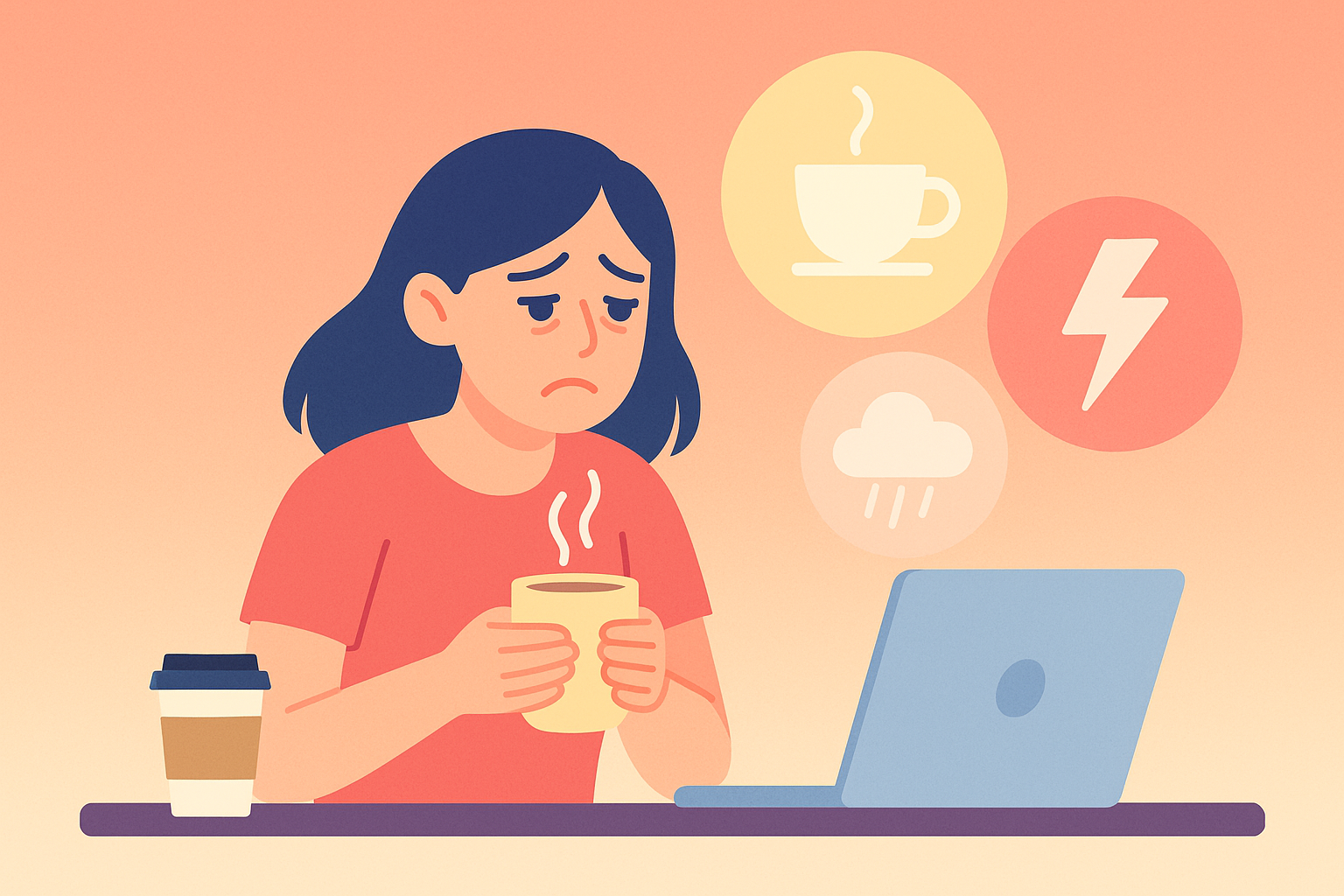
Derealization After Caffeine, Burnout, or Stress: Why It Happens & How to Stop It
If you've ever had coffee and suddenly felt "weird," unreal, floaty, or disconnected from your surroundings, you're not imagining it. For many people, caffeine and high stress can trigger or intensify derealization — especially if you're already dealing with anxiety or DPDR.
And if you're burnt out, exhausted, or overwhelmed, even a small amount of caffeine or stress can push your nervous system over the edge, creating that dreamlike, foggy sensation.
The good news: this reaction is extremely common, it's not dangerous, and there are simple ways to prevent and calm it.
Why Caffeine Can Trigger Derealization
Caffeine is a stimulant. It increases alertness by raising levels of adrenaline and activating your body's stress response. This can be totally fine when your nervous system is stable.
But when you're anxious, tired, or already overloaded, caffeine can push your system into fight-or-flight — the same biological state where derealization often appears.
Caffeine can cause:
- Rapid heartbeat
- Shaky or jittery sensations
- Increased self-awareness of bodily sensations
- Lightheadedness or floatiness
- Spikes in adrenaline
These physical sensations mimic the early stages of anxiety or panic. When your brain interprets them as a threat, it may respond by creating a sense of detachment — a protective dissociation that feels like derealization.
For people sensitive to DPDR, this reaction is very common.
Why Derealization Happens During Burnout
Burnout isn't just feeling tired — it's what happens when chronic stress overwhelms your nervous system. Long-term stress keeps your body in a semi-permanent fight-or-flight mode, which eventually leads to:
- Emotional exhaustion
- Sleep disruption
- Foggy thinking
- Sensory changes
When your brain is depleted and constantly scanning for threats, your perception can become distorted. This can create:
- A dreamlike or distant feeling
- Sensory "fog" or visual flatness
- Dizziness or detachment
- Emotional numbness
Derealization in burnout is your brain saying: "I can't process this level of input right now."
Stress: The Most Common Trigger
Stress is one of the biggest triggers of derealization. Whether it's work pressure, emotional conflict, or even mild overstimulation, stress floods your system with adrenaline and cortisol.
When the nervous system becomes overwhelmed, one of its protective strategies is dissociation — pulling you back from sensory and emotional overload.
That's why derealization is so common during:
- Panic attacks
- High anxiety days
- Chronic stress cycles
- Periods of sleep loss
It isn't your brain malfunctioning — it's trying to protect you from too much input.
Alcohol Can Also Trigger or Worsen Derealization
Although it's not a stimulant like caffeine, alcohol can also make derealization worse for some people because it:
- Disrupts REM sleep (fueling fogginess)
- Causes rebound anxiety the next day
- Alters blood sugar levels
- Impacts your vestibular (balance) system
The combination of fatigue, anxiety, and sensory imbalance the next morning can easily create or worsen derealization.
Why These Triggers Hit Some People Harder
Not everyone reacts this way to caffeine, burnout, or stress — and that's okay. Sensitivity to derealization is often linked to:
- A history of anxiety or panic attacks
- Trauma or chronic stress
- Sleep deprivation
- Perfectionism or high self-monitoring
- Nervous system sensitivity
If you're prone to DPDR, your nervous system is more likely to misinterpret normal bodily sensations as danger — especially when overloaded.
How to Reduce Derealization From Caffeine, Burnout, or Stress
You don't need to swear off caffeine or quit your job to get relief. Here are practical steps that help most people feel grounded again.
1. Delay Caffeine Until After Breakfast
Drinking caffeine on an empty stomach can spike cortisol and worsen perceived stress. Try:
- Eating first, then having your coffee
- Switching to half-caf
- Delaying your first cup by 60–90 minutes
Many people notice a massive difference from this alone.
2. Hydrate Before and After Caffeine
Dehydration magnifies jitteriness and dizziness. Drink a glass of water before caffeine and one afterward to stabilize your system.
3. Slow Breathing to Offset Stimulant Effects
Use this pattern for a minute or two:
- Inhale through the nose for 4
- Hold for 1
- Exhale for 6
Longer exhales activate your calming system (parasympathetic nervous system).
4. Interrupt the "Unreal" Feeling With Sensory Grounding
Your perception becomes distorted when anxiety and adrenaline take over. Sensory grounding sends the message: "We are safe." Try:
- Holding something cold
- Pressing your feet firmly to the ground
- Touching textured objects (fabric, carpet, wood)
- Naming objects around you out loud
These techniques help re-anchor your senses when they're overloaded.
5. Support Your Nervous System Daily
Derealization thrives on nervous system exhaustion. Support your baseline with:
- Consistent sleep
- Regular meals (no skipping lunch!)
- Light daily movement
- Reduced stimulants
- Stress boundaries and breaks
The more regulated your system is overall, the less likely derealization will appear.
6. Take Breaks Before You Hit Burnout
You're not weak for needing rest. Burnout removes your emotional and sensory "padding," making you more vulnerable to DPDR.
Try small resets throughout the day:
- Step outside for fresh air
- Do a quick body scan
- Stretch every hour or two
- Practice 1–2 minutes of paced breathing
When to Seek Support
Derealization becomes more distressing when it feels constant, unpredictable, or tied to deeper anxiety. Consider talking with a doctor or therapist if:
- It lasts for weeks or months
- It's interfering with daily life
- You're avoiding places or activities because of it
- You feel hopeless or scared you'll never feel normal again
Professionals can offer grounding-based therapies, anxiety treatment, trauma work, and personalized strategies that help stabilize your nervous system.
You're Not "Crazy" — Your Nervous System Is Overloaded
Whether it's caffeine, burnout, or stress, derealization often shows up when the brain says, "This is too much." It's a temporary protective response — not a sign of psychosis or permanent damage.
With nervous system support, calmer breathing, gentle lifestyle shifts, and grounding tools, these sensations usually become far more manageable — and often fade significantly over time.
Presently gives you tools for the exact moments when you feel "unreal." Try guided grounding, breathing exercises, grounding audio, and gentle symptom tracking to support your nervous system day by day.
